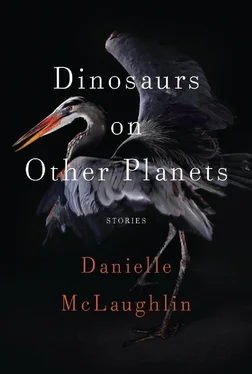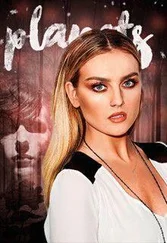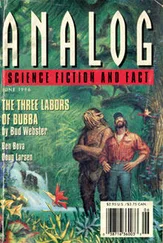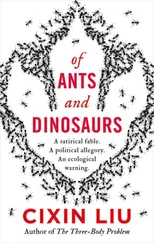The hall had been clean enough, well-kept apart from the unmended fanlight and a lingering smell of cooking, something spiced and unidentifiable. Climbing the stairs behind Lou Anne, I saw a layer of dust along the dado rail and on the picture frames. Four doors led off the landing. One was partly open, and I could see the enamel corner of a bath, and blue and white tiles on the wall. “I’ve put you in Daddy’s old bedroom,” Lou Anne said, pushing open a door. “It’s Daddy’s old bed, the springs are a bit rickety, but the mattress is new.” The air felt older here than in the hall, thicker, as if it had been fermenting. Lou Anne went over to the window and opened the curtains to let some light in. “We haven’t used this room in a while,” she said. “I did try to sleep here once after Daddy died, but it was just too strange.” There was a bed beneath the window, and at the foot of the bed a wardrobe. Shoehorned into one corner was a desk in cheap plywood, the self-assembly kind, newer than the rest of the room, with a lamp and a vase of yellow flowers that looked suspiciously like dandelions. “Marcus made the desk,” Lou Anne said. “We had to take off the skirting board to get it to fit.” Marcus. My mother had mentioned another lodger; he was “from the country, too,” which seemed to give her some comfort, though I knew she’d be better comforted were he a girl. “I’ll leave you to it,” Lou Anne said. “Come downstairs when you’ve unpacked and we’ll have a bit of supper.”
As I hung up my clothes, I could hear Cassie moving about in the next room, the occasional creak of bedsprings, the soft thud of things dropped. I wondered if Marcus was home, and listened out for other sounds, but there were none. In the wardrobe I found a plastic bag full of men’s ties, paisley patterned with the knots hardened into them. They still held the smell of Lou Anne’s father, a smell of sweat and tobacco, and I pushed the bag to the very back and stood my empty suitcase on top of it. When everything was put away, I sat on the edge of the bed and watched, through the net curtains, traffic going by on the road outside. I sat there for as long as I thought I could get away with and, when I could put it off no longer, I went downstairs.
I found Lou Anne in a room toward the front of the house setting a circular table with cutlery. “Can I help with anything?” I said, because my mother had warned me a hundred times that I must offer to help.
“It’s just a bit of cold meat and salad,” she said. “I have it ready in the fridge.”
This room had a wounded look, a sense of damage inflicted from myriad tiny skirmishes over many years. It was heavy with furniture: As well as the dining table and chairs there was a tallboy with dusty cacti; a nest of tables piled with out-of-date telephone directories; glass-fronted cupboards crammed with yellowing silverware. I imagined what my father would say if he saw it, how he would delight in its chaos, squirreling away details to use as ammunition against my mother. Against one wall was a piano strewn with magazines and other paraphernalia, so that it looked like some effort would be required to raise the lid.
Lou Anne returned with plates on a tray: slices of yellow-crumbed ham beside circles of almost translucent cucumber and quartered tomatoes, spoonfuls of different kinds of salad. This was what my mother served to visitors, though Lou Anne’s version was less practiced: Already the pickled beetroot was bleeding red juices into the coleslaw, turning it pink. “Sit, sit,” she said, and as I took a seat I noticed that there were four place settings. Lou Anne was busy now with a tea set, cups and saucers resonating off each other like tuning forks. “At last!” she said, when the doorbell rang. “Why does he have to be so late?” She went out to the hall and I heard the bolts sliding across and then a man speaking. “There was a march on O’Connell Street,” he said. “I was stuck on the bus for an hour.”
“You could have got out and walked.” That was Lou Anne against a backdrop of bolts.
“Well, I couldn’t, could I? I hadn’t rosary beads on me.”
“Shh,” Lou Anne said. “She’s here.”
He came to the door of the living room. “Why, hello,” he said. “I didn’t think you were arriving until later.” He was short and slight, with dark hair and a dark beard. He wore a black leather jacket, and a satchel was slung over his shoulder, though he looked old for a student, late twenties or thereabouts.
“Daddy had to take calves to Tuam,” I said, “so he dropped me to the bus early.” Immediately, I regretted it, because why did this man need to know about our calves?
“It must be demanding for your father — the farm, I mean — now that your brother’s gone to England.”
I didn’t like him knowing that about us. I wondered what else Lou Anne had told him.
“I’m Marcus,” he said then, and he came over to the table and shook my hand. I wondered if I should tell him my name, or if he knew that, too, but he turned to Lou Anne, who was standing behind him. “How’s she been today?”
“Oh, you know,” Lou Anne said. “The same; she’s been the same. I rang the surgery, but Dr. Raymond is still away and it’s that locum doctor. You know what he’s like.”
“Did you tell him about her headaches?”
“He kept going on about getting her reading glasses. How many times do I have to tell you, I said to him, she doesn’t read.” She threw her hands up in disgust. “Does he even look at her file?”
“Should I try talking to him?” Marcus said.
“We can’t fall out with him,” Lou Anne said. “We might need a prescription before Dr. Raymond gets back. We’ll have to muddle through until next week.” She took the satchel from his shoulder. It was beaded with drops of rain, and she wiped it dry with the sleeve of her dress before hanging it on the back of a chair. She pushed a slick of wet hair out of Marcus’s eyes and went to help him off with his jacket, which was wet, too, but he unzipped it himself and hung it beside the satchel. “I’ll go fetch her for supper,” he said, and he went upstairs.
Lou Anne stood for a moment, twisting her ponytail. Her gaze wandered absently around the room as if she’d been looking for something but had forgotten what. Her eyes came to rest on me, and she flinched, as if suddenly remembering I was there. “Get the napkins, would you?” she said, and she gestured to a mahogany dresser on the far side of the room. I located the napkins in the middle of a sea of crockery and knickknacks, and when Lou Anne didn’t show any sign of doing anything with them, I placed one at each setting.
Marcus returned leading Cassie by the hand. She had on a blue quilted robe over her pajamas, buttoned to the neck. In her free hand was a glass jar with little black beads rattling about the bottom. She didn’t come as far as the table but hung back a little, pulling at her plaits. “Cassie,” Marcus said, “say hello to Louise,” but she just stared. Marcus tried again. “Cassie,” he said, but Lou Anne interrupted. “Oh, just leave it,” she said. “She knows who it is. I’ve explained,” and, pulling out a chair, she sat down and began to butter a slice of bread.
Marcus gave a little shrug and took a chair next to mine. Now that he was closer, I saw that his jumper was worn at the elbows and had a hole at the front that was unraveling. He patted the chair on the other side of him and Cassie sat down. She placed the jar in front of her on the table, and I saw that the black things weren’t beads but a dozen or so dead wingless bluebottles. Marcus lifted the jar, put it on the floor beside Cassie’s chair. She followed the back-and-forth of his knife as he cut her ham into small pieces, then did the same with her tomato. He took a forkful of food from his own plate and, nodding at Cassie, put it in his mouth. As if it were a signal she’d been waiting for, she picked up her own fork and did the same.
Читать дальше












